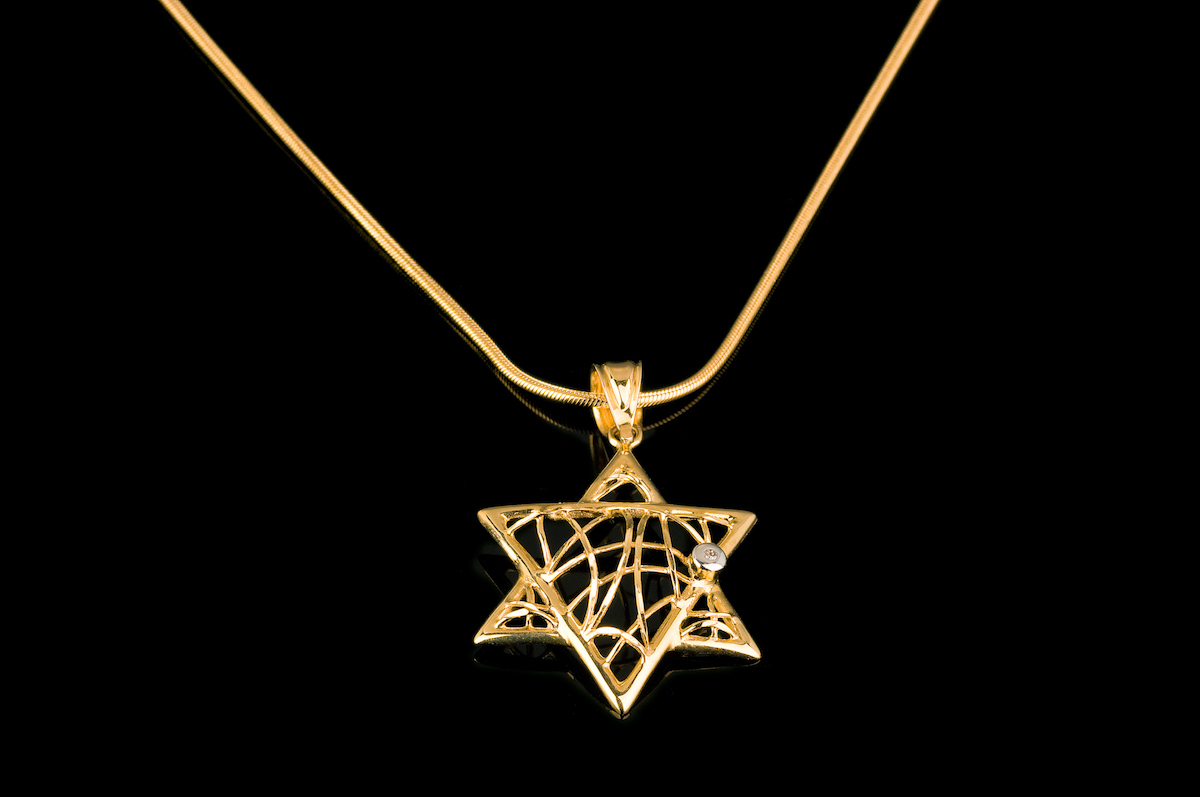When I was a child, my brother gave me a Star of David that had been passed down in my family for generations. Its original owner, our great-grandfather, came to New York from Romania, fleeing the Holocaust.
“I think you should you have it,” my brother said.
At the time, I’d wanted a Star of David necklace but was waiting to find a unique one. I wanted something that no one else would have, that would be as personal and distinctive as my own uncommon ethnic mix and relationship to Judaism. This necklace was perfect: an asymmetrical Star of David charm with the Chai symbol in the middle. It rested on a chain beside my Archangel Michael medallion.
It was important for my necklace to look like no other, because I felt that my heritage was like no other: I am Latino and Middle Eastern, and while I am religiously Catholic, I was raised with both Christian and Jewish traditions.
My Jewish family members are not blood relatives, but this never mattered when I was a child. While my own father is Turkish and not Jewish, my brother’s late father was Jewish — and so was the rest of his paternal family. But these distinctions never mattered to us; as far as we are concerned, his Romanian-American Jewish family is mine as well. I’ve always called them my grandparents, my cousins, my aunts, and my uncles, and was never put under the impression they were anything less. And so, I grew up celebrating Hanukkah, eating Jewish foods, being encouraged to learn Hebrew and Yiddish, and ultimately wearing a Star of David necklace.
In middle school and high school, I was seldom interrogated about my necklace. Sometimes people asked if I was Jewish, to which I said that I had Jewish family. That was accepted: No one looked at my face—clearly Latino, clearly Middle Eastern—and asked how I could be so many things at once.
Just before college, though, one of the chain links broke and I decided to leave my necklace at home.
“It’s safer here for now,” I told my mother, “and I’ll pick it up next time.”
I had every intention of bringing the necklace to college someday, but I didn’t. I found that the cultural camps in my new environment were more clearly divided than they had been at home, and that, being a Latina-Turkish-American, I was already testing more boundaries than people felt comfortable with. After all, how could it be that I took people of color issues, anti-Muslim sentiment, and anti-Semitism personally? For a while, my everyday appearance did not indicate my Jewish connections, but still, questions inevitably arose.
“It’s super weird that you have menorahs in the house,” a friend from college said while visiting me, “and that there are paintings of rabbis and stuff.”
“I told you I have a lot of Jewish family,” I said. “And my grandma was a painter. Those are her paintings.”
She stared at a painting of a boy holding a Torah. “Still weird,” she said.
People say, “But you’re not Jewish by blood, right?”
I say no because I can’t say anything else. But what does the term “by blood” mean, anyway? Does it imply that if you cut me open, my veins would look different? I understand that I do not share Romanian ethnicity with my Jewish relatives any more than they share Middle Eastern ethnicity with me. I understand that my Catholic ancestors were not subject to anti-Semitism. It feels wrong, however, to deny a family and cultural upbringing that I’d always been taught to embrace.
If I’m being honest with myself, by the end of college I left my necklace at home not only because I worried for its safety (it’s college, after all) but also because I didn’t want to be accused of cultural appropriation or to find myself needing to explain my family tree. Most of all, I didn’t want to hear others contest a part of my identity that has always been important to me.
I grew up in a multi-ethnic, multi-religious, multicultural household. We mix Puerto Rican, Turkish, and Jewish traditions so seamlessly and beautifully that it never occurred to me that people would question us.
Once, I asked my mother if my late Jewish grandmother ever thought it was an issue that I wasn’t “blood-related” to her.
“That never mattered to her,” she said. “She wanted to be your grandmother from the start. She asked me early on if you could call her Grandma.”
It was that simple.
Last summer, my cousin on the Jewish side of my family enrolled her son in the summer camp where I worked. We hadn’t seen each other in years, and though I watched over her son with a particularly sharp protective instinct, I never told him we were related for fear of being contested.
But one day while he sat beside me at the pool, he said, “Mommy says you’re our cousin.”
I smiled. “Yeah,” I said. “I’m your cousin.”
He said, “That’s so cool,” and put his head on my shoulder.
It was so easy for him to accept our familial ties without an explanation of how we’re related or why we don’t look alike. I hope that the gates to the cultural enclaves open by the time he grows up so that for him, it will always be easy to accept love as an answer.



